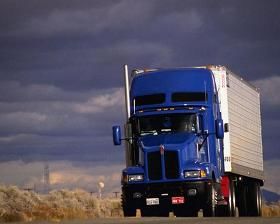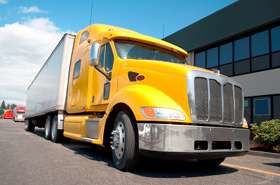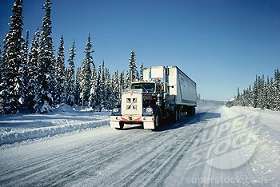That Nagging Question: Can I Make More Money At Trucking As As Owner Operator?
Topic 10121 | Page 3
First I'd like to say thank you... to all of you for your time and patience with this forum... frankly for this site. Of all the people I've spoken with about this industry I have to say that I'm impressed with all of you for many different reasons.
I've been a journalist all my adult life... covered news and done documentaries and tv shows all over the world, and the insight and eloquence I've seen here is amazing. So once again... Thank You All!
My objective here is to learn. I'm not a kid but I'm a newbie to this industry and what I know about it is probably more dangerous than helpful so I make no claims to know anything about trucking as an industry or life style. But, what I have seen is that the industry is full of, how do you say this... contradictions and misinformation.
Yes, there are many people as in all walks of life, who will give you the straight story but it's hard coming from the outside to know who, where and how to find these people so I congratulate you all for being here for those of us interested in or transitioning to this life.
So with that said here is question about new versus old, lease versus purchase or company driver;
As I wrote earlier I have heard of, legitimately, some guys driving their own rigs making over a dollar, or even over 2$'s a mile. I don't know how common this is or how long that can last but is it possible to make more than the stated start off pay of .38 to .45 cpm? How realistic is it if it is, and what type of runs, other than extreme cargos can generate that kind of money per mile?
Something tells me it's the smaller companies working contracts that do that since the big companies don't seem to pay anywhere near that kind of money per mile.
All of this relates to the earlier questions about ownership versus leased rigs, new versus old.
Please forgive me if this isn't the right place for this question; I'll figure this site out as we go. I'm want to make the jump into driving for a variety of reasons... I'm willing to learn... work hard... and keep slugging away at it. One way or the other I'm going to get my CDL and be driving within the year.
cheers to you all.... Tony
CDL:
Commercial Driver's License (CDL)
A CDL is required to drive any of the following vehicles:
- Any combination of vehicles with a gross combined weight rating (GCWR) of 26,001 or more pounds, providing the gross vehicle weight rating (GVWR) of the vehicle being towed is in excess of 10,000 pounds.
- Any single vehicle with a GVWR of 26,001 or more pounds, or any such vehicle towing another not in excess of 10,000 pounds.
- Any vehicle, regardless of size, designed to transport 16 or more persons, including the driver.
- Any vehicle required by federal regulations to be placarded while transporting hazardous materials.
CPM:
Cents Per Mile
Drivers are often paid by the mile and it's given in cents per mile, or cpm.
HOS:
Hours Of Service
HOS refers to the logbook hours of service regulations.
I spoke with a lease operator this morning at a rest area near Canby Oregon. I asked him why he leases his truck. He stated the reasons commonly given on this forum: freedom to chose routes, fuel stops, his loads, drive ungoverned and increased home time. As we talked he said these freedom's actually cost him money and he was actually spending less time at home in Oregon because it was getting more difficult to get good paying loads back into southern Oregon where he lives. He said he has a friend who does most of his driving in the Midwest and flies back to Oregon every 6-8 weeks for home time and he's considering doing the same thing because the pay is better in the Midwest. I asked him if he would consider being a company driver again and he said he would if he could find something local, but he wasn't ready to give up his dream of owning his own truck yet. He said he's been driving 7 years, the last 3 leasing. I enjoyed the chat and wished him well as we parted ways.
I'm just curious who do you drive for and what kind of rates are you getting. All I run is I5 from L.A. to Oregon and Washington. I'm always in Oregon or Washington after I pick up a load out of California and from my experience I get some pretty decent freight. I just picked up at Ready Pac in Irwindale, CA which is right in the LA Valley and it's paying me $1.98 so I'm curious as why you can't find freight on the West Coast. I don't have problem pulling them kind of Loads out of WA or CA. Oh and this load weighs about 2000 pounds, gotta love Produce!
HOS:
Hours Of Service
HOS refers to the logbook hours of service regulations.
My bad misunderstood what you was saying, sounds like your a company driver just interested in the subject of being an O/O but anyways I don't have a problem with freight in the West and running through Oregon.

Hammertime,
You are right. I am a local company driver. I read the forum regularly and this does interest me. I feel bad for the driver I talked to, because he's obviously in a tough situation. I just tried to share what he told me.

So just out of curiosity, if a big trucking company is giving you $0.40 per mile or so, what are they keeping for themselves? How much do loads pay per mile? (it depends on the load of course, but just looking for an average) Does a company get paid $1, $1,50 over $2? As the majority of the truckers out there seem to be O/O's, there must be money in it, no?

So just out of curiosity, if a big trucking company is giving you $0.40 per mile or so, what are they keeping for themselves? How much do loads pay per mile? (it depends on the load of course, but just looking for an average) Does a company get paid $1, $1,50 over $2? As the majority of the truckers out there seem to be O/O's, there must be money in it, no?
Top 100 trucking companies in the US have an average operating ratio of 95 percent. For every dollar they earn, they make 5 cents profit. Although I don't know what they make on an average run, they have to make enough to cover our labor and direct and indirect costs of running the truck.
There are about 350,000 O/O drivers in the US. There are about 3.5 million truck drivers. Based on these figures that's about 10 percent.
The debate over O/O vs company drivers will never achieve a consensus agreement. I do believe that attempting to be an O/O right out of the gate as an entry level driver is a mistake. Give yourself time to learn the business.

I absolutely agree that trying to run O/O or L/O is a mistake for anyone new and for many people who are experienced if they have the wrong reasons or expectations, but I also firmly believe that there ARE valid reasons for SOME people to own their own truck. Myself, I do plan to run as a company driver for a few years while I save up money, but eventually I think there is a good chance I may purchase my own truck, and I can tell you how and why and what my expectations are.
First of all, I would buy a used truck a few years old in good condition for about 25% of its new value, I would buy it outright no payments, and I would have an emergency/maintenance fund already built up. I am also mechanically inclined and I would do most of my own maintenance and repairs.
Also, every O/O discussion here seems to center on the question "Can I make more money as an O/O?" Well simply put, yes you can but its not easy and its really not a good reason to go O/O at all. I personally don't care if I make EXACTLY the same as a company driver after expenses, or possibly even slightly less because my reasons (and I suspect many O/O's reasons) for wanting to own my own truck have nothing to do with the money. I want to own my own truck because I love the trucks and I want that pride of ownership, I want to know it is mine and I can do whatever I want with it, I can modify it if I like, I can sell it if I like, I can live in it indefinitely, I can work for a company with it or I can be independent, I choose when to run, where to run, what to haul, I can take my truck home anytime for as long as I wish (and YES it will cost me money to do so but at least its my choice and my option as an owner, so maybe I want to be home for something important and I don't care if it costs me some money, I can do that when a company driver is at the mercy of his DM).
So yeah you pay for freedoms BUT they are still freedoms that you have and can use whenever you wish, and to some people that is more important than money. Now granted, Brett is very right in saying that if you're leased on with a company and you start refusing a bunch of loads, they aren't going to like that, so you have to have good work/life balance and a good work ethic, but I still believe owning your truck gives you more flexibility and options than a company driver has. I also just want to know its my truck and no one can ever tell me to pack up my things and get off the truck.
There are plenty of reasons many people should not go O/O, but there are also good reasons for certain people to go for it, if its right for them and its what they really want after understanding what it really means for them.
Dm:
Dispatcher, Fleet Manager, Driver Manager
The primary person a driver communicates with at his/her company. A dispatcher can play many roles, depending on the company's structure. Dispatchers may assign freight, file requests for home time, relay messages between the driver and management, inform customer service of any delays, change appointment times, and report information to the load planners.OOS:
When a violation by either a driver or company is confirmed, an out-of-service order removes either the driver or the vehicle from the roadway until the violation is corrected.

Good point Kieran L. PRIDE of ownership ... I would just want to get a new truck so that I know that it's clean inside and that no one else has slept, farted, coughed or did any other nasty stuff in the truck. My dream is actually to get a restored/refurbished cab-over from the 1980's ... would that be even feasable to run cost-efficiently, or am I just dreaming? Just wondering though, does dispatch favour it's own company drivers over owner operators? Maybe O/O's get the leftovers. Can someone with experience on the dispatch side chime in? And in the same vein, has any driver turned dispatcher or vice-versa? I have too many questions, sorry, but this is all new to me!
Owner Operator:
An owner-operator is a driver who either owns or leases the truck they are driving. A self-employed driver.
Dispatcher:
Dispatcher, Fleet Manager, Driver Manager
The primary person a driver communicates with at his/her company. A dispatcher can play many roles, depending on the company's structure. Dispatchers may assign freight, file requests for home time, relay messages between the driver and management, inform customer service of any delays, change appointment times, and report information to the load planners.
Dispatchers favor company drivers over owner operators. The company drivers make and save money for the company. Companies make money from lease operators from the weekly truck payments and maintenance fund. Owner operators are almost always used when there are no company drivers available or there are no lease operators available. I never gave owner operators priority over company drivers. Quite frankly I was not allowed to. The lease operators get enough loads to make the truck payments and to make the maintenance fund. Lease operators have as much freedom as company drivers plus the stress of making their weekly payments. The company knows this and so does the dispatcher. From my experience working as a dispatcher (I'm driving now) and looking at data from my cousins lease/op with CRST and then owner/op at Landstar, you'll make as much money as one of the more experienced company drivers, but with the downside of having to find loads or getting the loads dispatched to you. I believe the best bet if you want to be an owner operator is to haul freight most drivers don't want to haul because of the extra labor: flatbed freight.
Good point Kieran L. PRIDE of ownership ... I would just want to get a new truck so that I know that it's clean inside and that no one else has slept, farted, coughed or did any other nasty stuff in the truck. My dream is actually to get a restored/refurbished cab-over from the 1980's ... would that be even feasable to run cost-efficiently, or am I just dreaming? Just wondering though, does dispatch favour it's own company drivers over owner operators? Maybe O/O's get the leftovers. Can someone with experience on the dispatch side chime in? And in the same vein, has any driver turned dispatcher or vice-versa? I have too many questions, sorry, but this is all new to me!
Good point Kieran L. PRIDE of ownership ... I would just want to get a new truck so that I know that it's clean inside and that no one else has slept, farted, coughed or did any other nasty stuff in the truck. My dream is actually to get a restored/refurbished cab-over from the 1980's ... would that be even feasable to run cost-efficiently, or am I just dreaming? Just wondering though, does dispatch favour it's own company drivers over owner operators? Maybe O/O's get the leftovers. Can someone with experience on the dispatch side chime in? And in the same vein, has any driver turned dispatcher or vice-versa? I have too many questions, sorry, but this is all new to me!
Owner Operator:
An owner-operator is a driver who either owns or leases the truck they are driving. A self-employed driver.
Dispatcher:
Dispatcher, Fleet Manager, Driver Manager
The primary person a driver communicates with at his/her company. A dispatcher can play many roles, depending on the company's structure. Dispatchers may assign freight, file requests for home time, relay messages between the driver and management, inform customer service of any delays, change appointment times, and report information to the load planners.New Reply:
New! Check out our help videos for a better understanding of our forum features

















Preview:
This topic has the following tags:
Leasing A Truck Life On The Road Owner Operator Truck Driver Salary Truck Driving Lifestyle







 TT On Facebook
TT On Facebook
It's so hard to say unless you can tear into a used vehicle to the point that you can somewhat predict its reliability. But who can do that? I mean, you're talking about things like compression tests, injector tests, and determining the tolerances in the pumps - fuel pump, water pump, oil pump, power steering pump, air compressor, etc.
What about the main bearings?
What about the shift levers in the transmission?
What about the teeth on the transmission gears?
How do the differential gears look?
You could go on all day.
There's just no way you can really know for sure what kind of life a used truck has in it really. You're rolling the dice to some degree. You could do a major inspection like that of the whole truck but it's going to cost you a pretty penny.
And of course one of the big questions is how much of the maintenance can you realistically do yourself? Every minute you're sitting around doing repairs you're losing money. Do you have the time, the shop space, and the tools to do your own maintenance efficiently? Do you want to spend your precious time off turning wrenches?
Even the largest companies rarely stick with one set plan. They'll adjust what they're doing based on the economy. When the economy is strong and they're expanding their fleets they'll often turn in their trucks somewhere around 350,000-500,000 miles. But I know after the downturn in 2008 a lot of the large fleets were hanging onto their trucks a lot longer and downsizing at the same time.
So there's really no single answer for this that will work for all people under all circumstances. It really depends on a lot of factors.